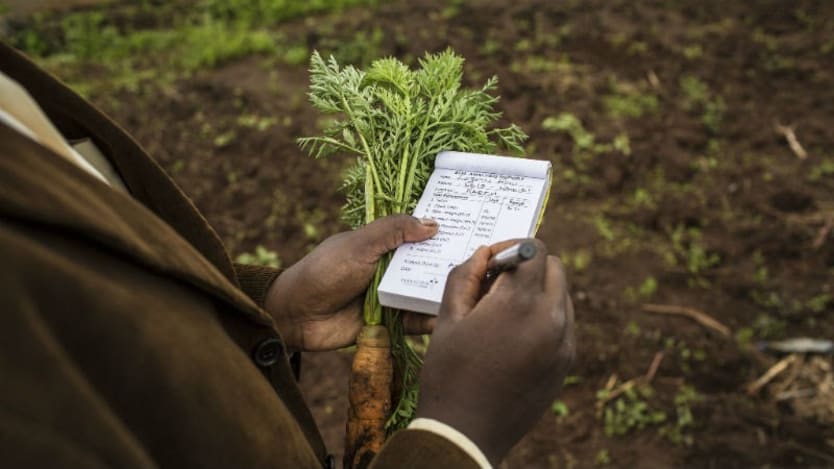
IKINU, Kenya — While the climate crisis is a major contributor to food insecurity in Africa, a lack of information on good agricultural practices takes a fair share of the blame. Unreliable and sometimes nonexistent agricultural extension services have led to poor agricultural practices, which can lead in turn to low yields for smallholder farmers in many parts of Africa.
“I do not know who the extension officer is, yet I am the area representative. If I do not know the extension officer, how will the farmer know him?”
— Stanley Kiarie, Kiambu County assembly memberIn Kenya, for instance, the agricultural extension service — which used to be offered by the government for free — has broken down in recent years. Private sector alternatives are sometimes too expensive for smallholder farmers who have learned to farm without any professional help.
Stanley Kiarie, an elected member of the local Kiambu County assembly, decried the absence of extension services in his county.
“In the ward that I represent, Ikinu, for instance, I do not know who the extension officer is, yet I am the area representative. If I do not know the extension officer, how will the farmer know him?” Kiarie asked.
He added that in addition to having very few extension officers, the budgetary allocation to agriculture is inadequate to procure quality extension services for farmers in the county.
With the devolution of agriculture functions to the counties, however, extension services might slowly be making a comeback in Kenya.
The Alliance for a Green Revolution in Africa has partnered with the Kiambu County government in Kenya’s central region to deploy agricultural extension services through a new “village-based adviser” — or VBA — model. Sometimes referred to as farmer-to-farmer extension, the model uses approaches that involve farmers themselves as agricultural advisers working with public, private, or NGO extension organizations.
Hannah Njoki, a farmer from Ikinu, used to harvest two bags of maize from her small plot, which measures 20 meters by 20 meters. That was before the advent of AGRA’s extension services initiative. She was among the first few farmers who were trained by a team from AGRA and the Kiambu County government. She then took to teaching her neighbors what she learned. This led to an improved yield on her farm, and she was able to help her neighbors improve yields on their farms.
“I now harvest five bags of maize from this same portion of land. I also use this same farm as a demonstration farm when other farmers come to learn,” she said.
AGRA’s mantra is that agricultural technologies and practices can only have a positive effect if they are communicated and implemented by farmers. The NGO estimates a ratio of 1 extension officer for every 5,000 farmers in most of its target countries. Its aim is to improve the ratio to 1 extension officer for every 500 farmers.
The VBA model, it said, has already reached this target in Kiambu County.
In addition to offering a grant and technical advice on the VBA model, AGRA partnered with seed and fertilizer companies in Kiambu County. Agnes Kalibata, president of AGRA, said that the transformation is evident on the farms.
“With very good extension services, which they have not been getting, and very good seeds and fertilizers, which they are getting from the companies that work here already, we are able to get this type of yield. So, the idea is to support the extension system,” she said.
Kiambu County’s governor, James Nyoro, is cognizant of the problem. He said he hopes that the extension services will improve livelihoods and food security in his county.
“Access to quality seeds and extension services has been a problem in the county, and we are working towards enhancing extension so that our farmers will be shown how to, say, plant maize, space it, and what to do when they have an invasion of fall armyworm,” he said.
In nearly two years since the initiative started in Kiambu County, 115 VBAs have been trained, and they have gone on to train 16,000 farmers. According to AGRA, informal surveys indicate that more than 10,000 farmers have increased their maize crop productivity by up to 100% since the extension services were introduced.
AGRA has implemented the program in a few other counties in Kenya and other countries in Africa. It hopes to improve food security through an increase in the number of VBAs.








